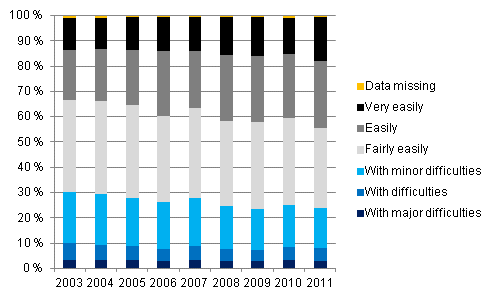Published: 28 December 2012
Number of households with difficulties in making ends meet diminished in 2011
Altogether 608,600 households had difficulties in making ends meet in 2011, which figure is around five per cent lower than in 2010. The income development of households with difficulties in making ends meet was in real terms weaker in 2011 than that of households on average. These data derive from the information collected in connection with Statistics Finland's income distribution statistics.
Ability to cover regular outlays with income in 2003–2011, % of households

Households finding it difficult to cope with their regular outlays with their income are defined as households with difficulties in making ends meet. The information is based on the data collected from 2003 onwards from households on whether they have managed to cover their regular outlays with their income with major difficulties, difficulties, minor difficulties, fairly easily, easily or very easily. In 2011, minor difficulties were experienced by 15.8 per cent, difficulties by 5.1 per cent and major difficulties by 2.8 per cent of households. In all, 23.7 per cent of all households had difficulties in making ends meet, and 7.9 per cent of households had greater difficulties (difficulties or major difficulties). In all, 44.0 per cent of households said that they found it easy or very easy to cover their regular outlays with their income in 2011.
The number of households with difficulties in making ends meet diminished in 2011 after having grown in 2010. Altogether 608,600 households had difficulties in making ends meet in 2011, which was around five per cent fewer than in 2010. The number and share of households with difficulties in making ends meet among all households were still slightly higher than in 2009. From 2003, the number of households with difficulties in making ends meet has declined by over 16 per cent.
The share of households with difficulties in making ends meet diminished in all socio-economic groups in 2011, except for unemployed and student households. In 2011, 63.7 per cent of unemployed households had difficulties in making ends meet and 49.1 per cent of student households, which is slightly more often than in 2010 (unemployed 61.8%, students 47.6%). Difficulties in making ends meet were most common for these groups, similarly as for other economically inactive persons (excl. pensioners). Altogether 49.7 per cent of the households of other economically inactive persons found it difficult to make ends meet in 2011.
The households with difficulties in making ends meet most often belong to the lowest-earning income groups. Per consumption unit, the equivalent disposable income of households was, on average, EUR 19,640 for households with difficulties in making ends meet, and EUR 27,490 for all households in 2011. Compared with an average household, the income level of households with difficulties in making ends meet is weaker than one year before. Per consumption unit, the equivalent disposable income of households with difficulties in making ends meet decreased in real terms by 0.7 per cent, for all households income grew by an average of 0.5 per cent in 2011. Last year, equivalent disposable income has increased equally for both by 2.5 per cent.
Source: Income Distribution Statistics, Statistics Finland
Inquiries: Marie Reijo (09) 1734 2547
Director in charge: Riitta Harala
Publication in pdf-format (181.8 kB)
- Tables
-
Tables in databases
Pick the data you need into tables, view the data as graphs, or download the data for your use.
Updated 28.12.2012
Official Statistics of Finland (OSF):
Income distribution statistics [e-publication].
ISSN=1799-1331. Subjective financial well-being 2011. Helsinki: Statistics Finland [referred: 22.2.2026].
Access method: http://stat.fi/til/tjt/2011/01/tjt_2011_01_2012-12-28_tie_001_en.html

